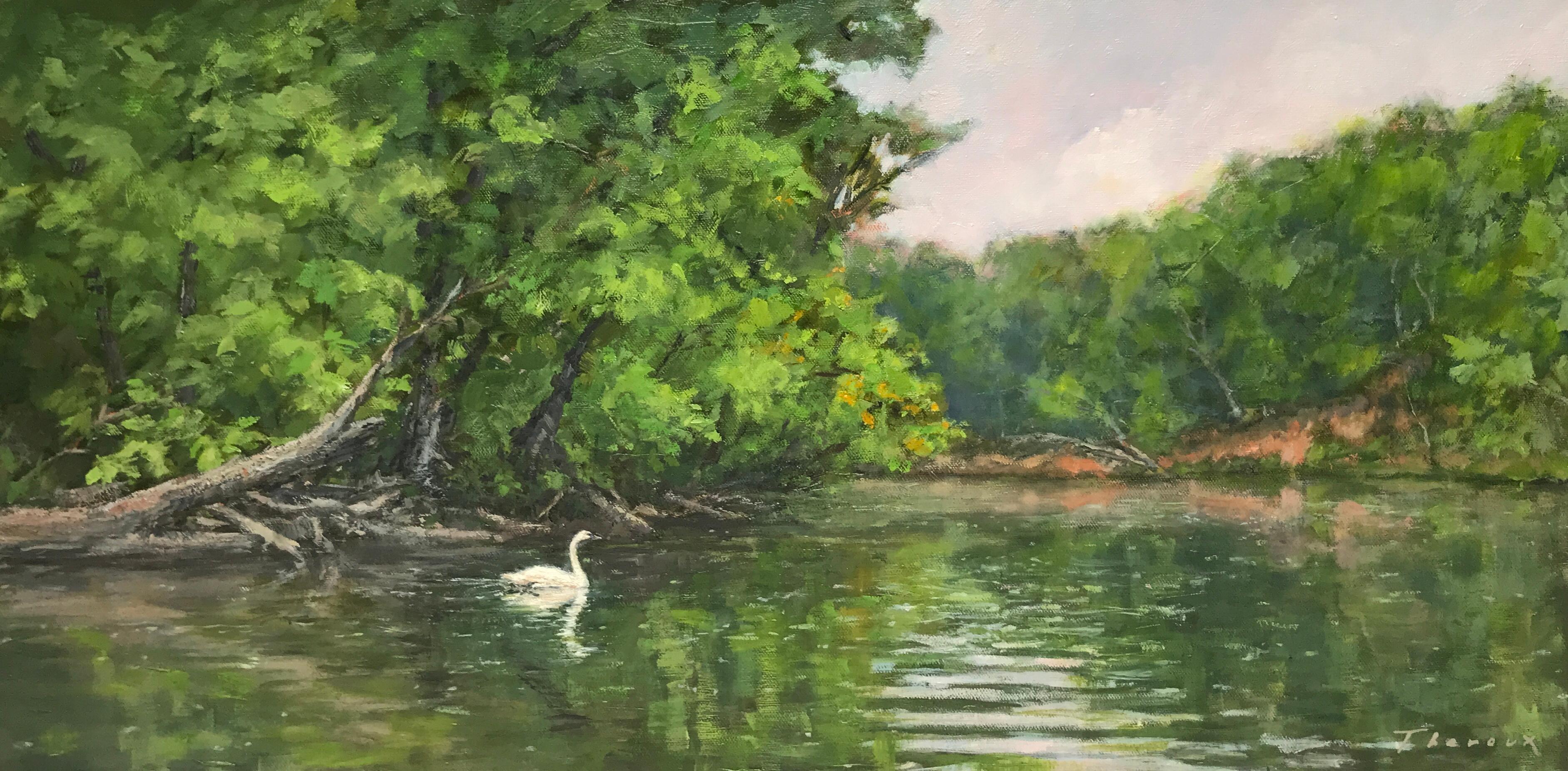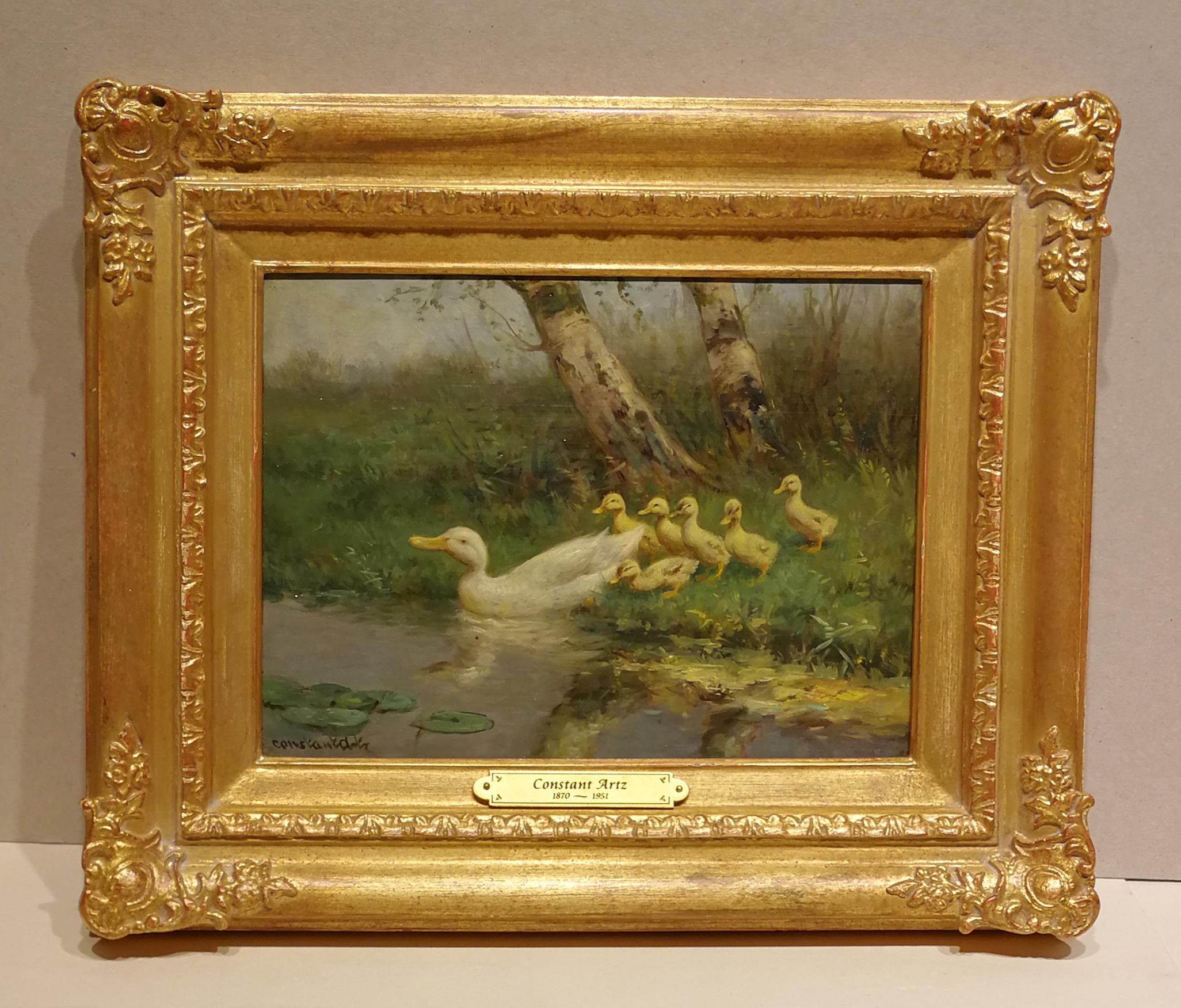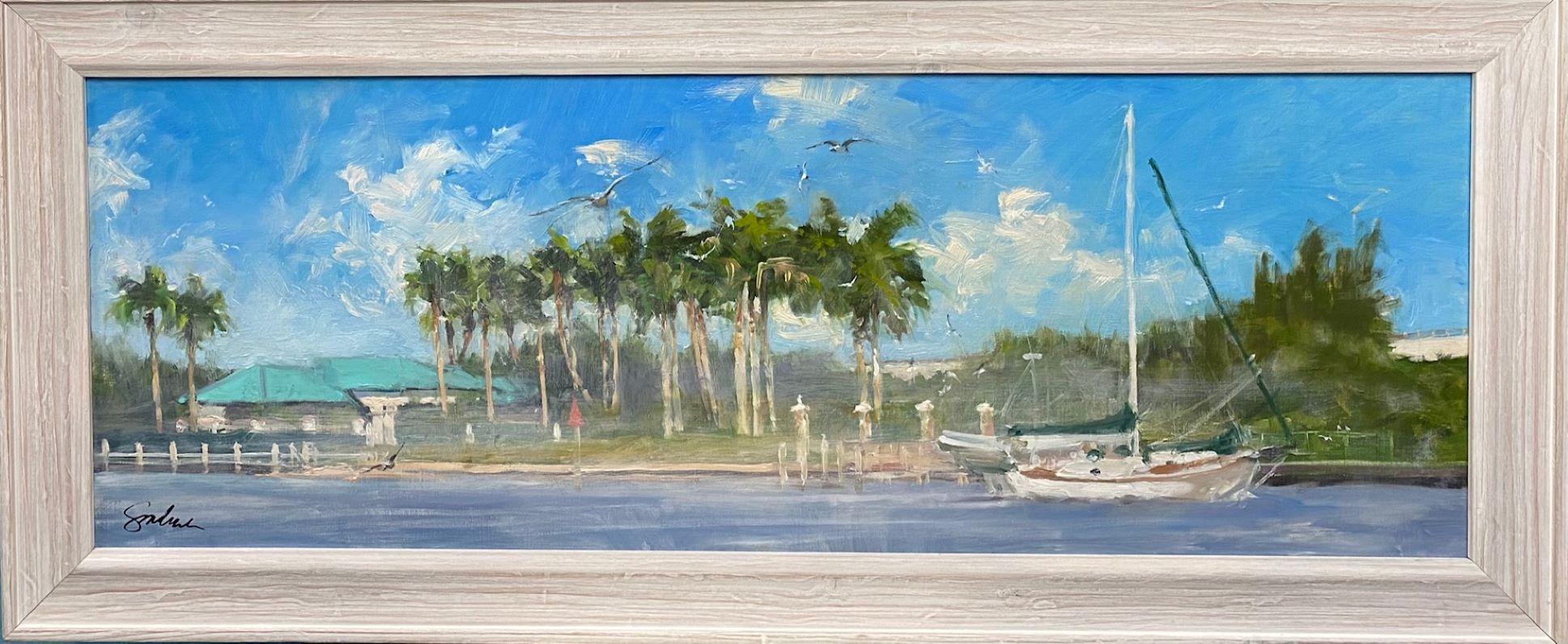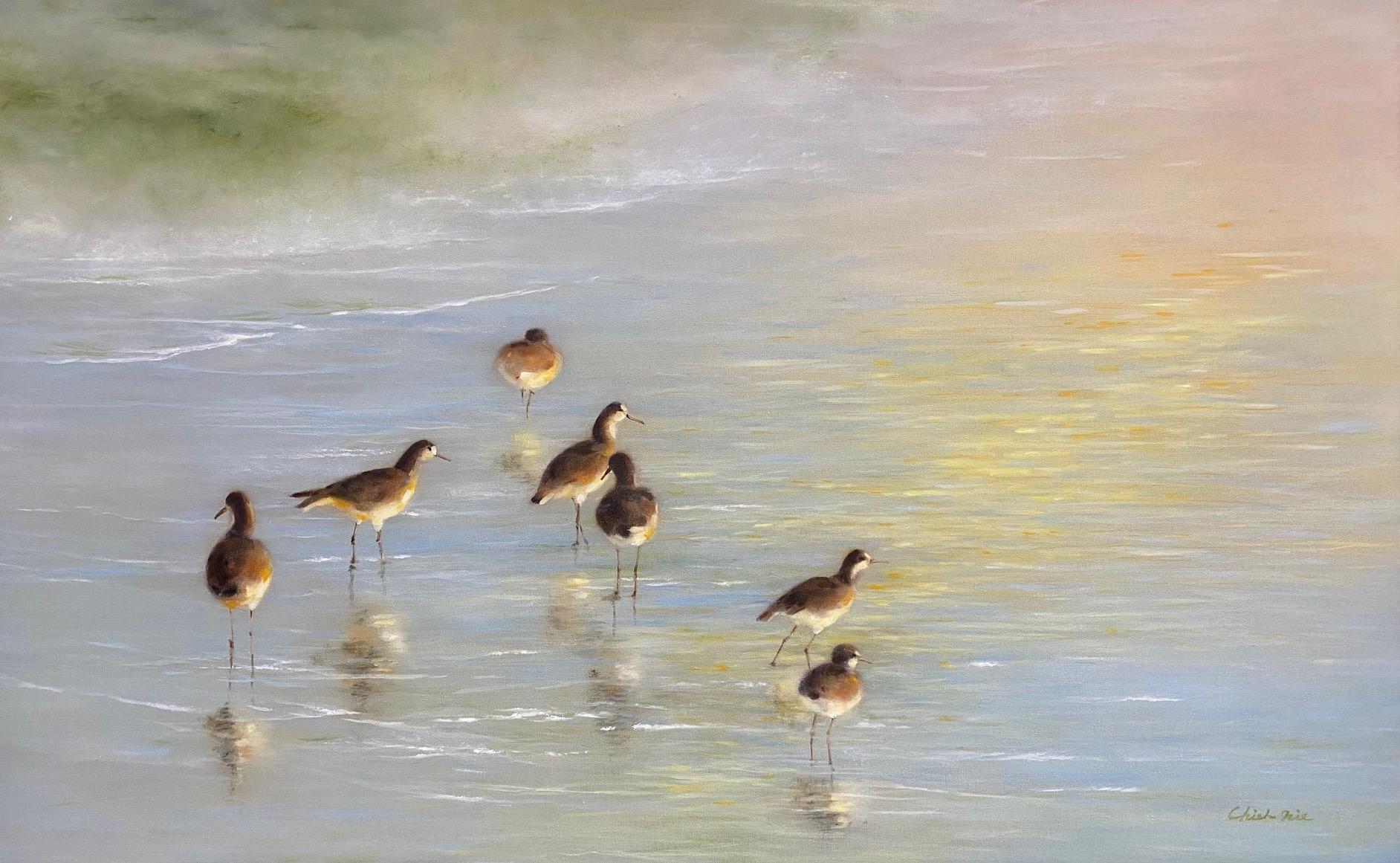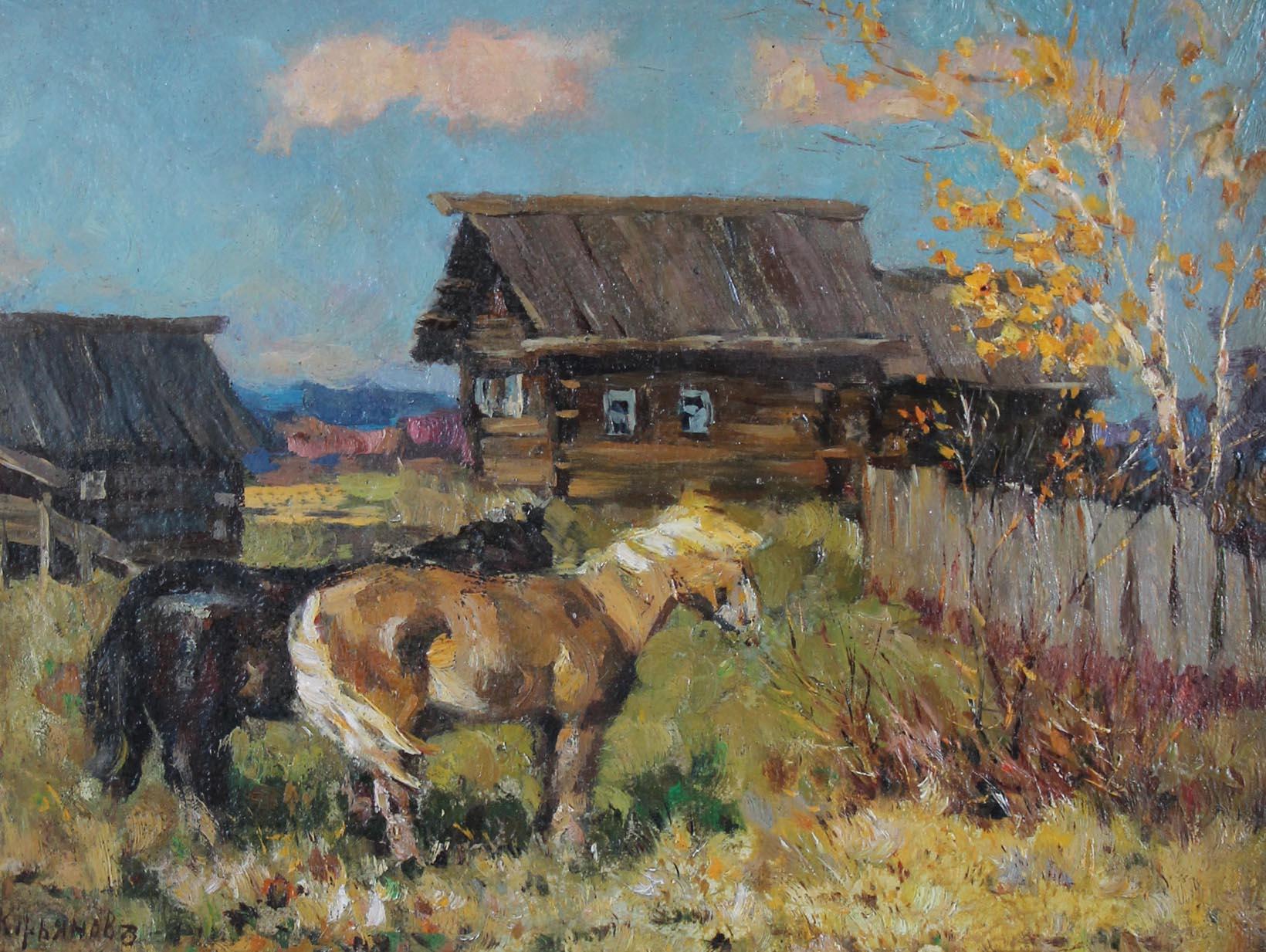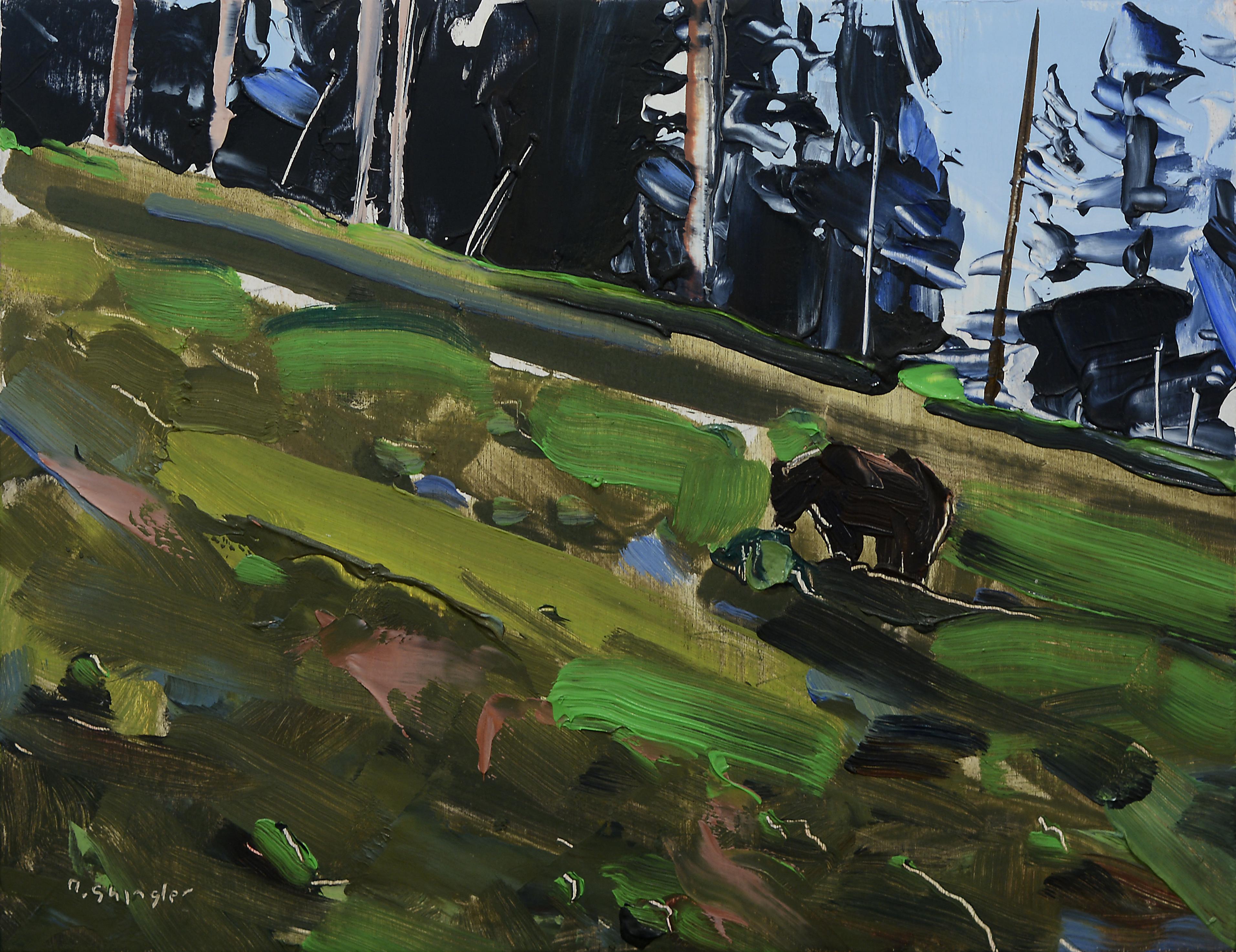Items Similar to "Home Corral" Very early Wieghorst California Western Painting awesome colors
Want more images or videos?
Request additional images or videos from the seller
1 of 24
Olaf Wieghorst"Home Corral" Very early Wieghorst California Western Painting awesome colors 1946
1946
About the Item
Olaf Wieghorst
(1899 - 1988)
California, New York, New Mexico, Arizona, Texas Artist
Image Size: 20 x 24
Frame Size: 29.5 x 33
Medium: oil
1946
"Home Corral" California Olaf Wieghorst
Without a doubt one of if not the most colorful Wieghorst paintings ever done. Signed lower left. Titled on verso. Dated on verso.
In very nice condition. Has been professionally cleaned. Has very fine craquelure in the tree branches and a small spot below the horse that is really only visible if you are extremely close to the painting or with magnification. One of his finest paintings. Also please view my other Wieghorst from the same estate. I have included close up photos as well as photos taken in natural light, spot light and fluorescent lighting.
Olaf Wieghorst
(1899 - 1988)
California, New York, New Mexico, Arizona, Texas Artist
Image Size: 20 x 24
Frame Size: 29.5 x 33
Medium: oil
"Home Corral"
Dated 1946
Biography
Olaf Wieghorst (1899 - 1988)
Born in Viborg, Denmark, Olaf Wieghorst was a child acrobatic performer from the age of nine when he began appearances at Tivoli Theater in Copenhagen and later toured Europe. He also learned horseback riding working on a stock farm, and horses became a major focus of his admiration and later his painting.
In 1918, he arrived in the United States, having worked as a cabin boy on a steamer. He served in the 5th U.S. Cavalry on the Mexican border in the days of Pancho Villa. He later recalled a favorite horse from that period and said that riding through El Paso in 1921, the horse fell on his ankle and broke it. The outfit was heading to Douglas, Arizona, and not wanting to be left behind with his injury, he stayed on the horse which carried him all the way through the New Mexico desert on one of the hottest days of the year. The horse died during the night, having expended all his energy on saving Wieghorst. He later wrote that when the Cavalry discarded the use of horses, "they took the soul out of that great branch of the service" ("Widening Horizons").
He wandered extensively through the West sometimes on horseback, finding work in Arizona and New Mexico as a cowboy. Then he went to New York and served as a mounted policeman until 1944, spending most of his time on a horse named Rhombo patrolling the Central Park bridle paths and saving many people injury from runaway horses. He began painting in his spare time, and he was successful enough that his work was represented by the Grand Central Art Galleries of the Biltmore Hotel.
In 1944, he settled in El Cajon, California. His paintings include cowboys, horses, and Indians in landscape, but there is little if any collectible art of his done during his early days in the West. His primary output came after his return to California when he began painting cowboys and horses extensively. He did numerous horse portraits, spending time on ranches studying their unique personalities. He painted celebrity horses including Roy Rogers' Trigger, Gene Autry's Champion and Tom Morgan's stallion.
He was a large, powerful, handsome, and very personable man.
Source:
Kathleen Wade
Olaf Carl Wieghorst (1899-1988)
He arrived in the U.S. in 1918, joining the U.S.
Cavalry, & patrolled the Mexico border in New Mexico & Arizona . When he mustered out of the army, he drifted, ending up as a wrangler on
the Cunningham Ranch near Alma, New Mexico.
By the mid-twenties,
Wieghorst was in New York City, working as a mounted policeman - his
relationships with the many horses that were a part of his life became
the common denominator of his paintings. Living in California by the end
of WWII, he began a career that spiraled to success, in part due to his
engaging personality.
His paintings have appeared in numerous solo
& retrospective exhibitions including the National Cowboy &
Western Heritage Museum, Oklahoma City (1974), The Tucson Museum of Art,
Arizona (1981), & the San Diego Historical Society, California
(2002).
His work was the subject of the 1970 biography, "Olaf Wieghorst"
by William Reed.
Biography from Mark Sublette Medicine Man Gallery
Olaf Carl Wieghorst was born to a display artist and a photo retoucher in Viborg, Jutland, Denmark in 1899. His education was in the Copenhagen public schools and, at a young age, he developed an acrobatic act at the Tivoli Theater in Copenhagen where he was breathlessly billed as "Little Olaf- The Miniature Acrobat." By the age of fourteen Olaf Wieghorst, who would eventually grow to be over 6'4", was too big to be logically referred to as miniature, and started working on a stock farm, where he first learned to ride horses and began to teach himself to paint.
The passion that Olaf Wieghorst developed for horses would be a source of lifelong inspiration. Transfixed by the stories and images of the American west, Olaf Wieghorst joined the crew of a Dutch shipping vessel and promptly jumped ship in New York City, despite the fact that he had $1.25 to his name and knew not a word of English. Olaf Wieghorst joined the US Cavalry and was stationed at the Mexican border as a horseshoer, a job that allowed him contact with his primary preoccupation. He also learned rodeo and trick riding techniques from the men around him and further developed his painting style.
Olaf Wieghorst left the service and worked as a ranch hand in Arizona at the Quarter 2C Ranch, whose brand he adopted as his insignia. Olaf Wieghorst returned to New York City in 1923 and joined the police force, graduating in 1925. He was assigned to the Police Show Team of the Mounted Division, and continued to paint. The first professional representation Olaf Wieghorst had was in 1940 when an agent he had found sold vast quantities of his work to publishers as calendar art and western illustration.
The change in his lifestyle after he began to find artistic success was dramatic. By 1942 his commissioned paintings went for $500 and, two years later, Olaf Wieghorst had retired from the Police Department and was living in El Cajon, CA. Olaf Wieghorst would produce the majority of his life's work in California and would be best known during his lifetime as a painter of horse portraits, including such equine celebrities as Roy Rogers' Trigger and Gene Autry's Champion. ghWieghorst's work is in many prestigious western collections, including those of Barry Goldwater, The Eisenhower Library and the Whitney Gallery in Cody, Wyoming.
Olaf Wieghorst
Born: Viborg, Jutland, Denmark 1899
Important traditional Western painter specializing in horses, painter of horse portraits, illustrator, sculptor.
Wieghorst is the son of a display artist and photo retoucher who became an engraver. Educated in Copenhagen public schools, Wieghorst was "Little Olaf—the Miniature Acrobat" from age nine until 14. Interested in horses, the American "Wild West," and painting while apprenticed in a store an on a farm, he began painting in 1916. Working as a sailor in 1918, he jumped ship in New York City where he enlisted in the United States Cavalry for duty on the Mexican border. During his last three years of military service as a horseshoer, he learned rodeoing and trick riding.
He was mustered out in Arizona, finding work as a ranch hand on the Quarter Circle 2C Ranch who brand is now Wieghorst's insignia. In 1923 he returned to New York City, graduation from the Police Academy in 1925. Assigned to the Police Show Team of the Mounted Division, Wieghorst began to paint in his spare time. In 1940, he found an agent for his paintings, which immediately sold as calendar art and as Western illustrations. By 1942 he was receiving commission for horse portraits and bronzes, with fees up to $500.
In 1944, Wieghorst retired from the Police Department, settling in El Cajon, California in 1945. By 1955 he had a waiting list of buyers. "I try to paint the little natural things, the way a horse turns his tail to the wind on cold nights, the way he flattens his ears in the rain, seasonal changes in the coat of a horse, and the psychology of his behavior. Horses have been my life." Weighorst's biography was published in 1969.
Resource: SAMUELS' Encyclopedia of ARTISTS of THE AMERICAN WEST,
Peggy and Harold Samuels, 1985, Castle Publishing
Acclaimed by critics as the outstanding contemporary Western artist, Olaf Wieghorst earned these accolades during a lifetime of observing, handling and painting horses and the West.
Olaf was born to Karl and Anna Wieghorst on April 30, 1899, in the village of Viborg, Jutland, Denmark. He was only 19 years old when he came to New York on December 31, 1918 aboard an old Danish steamer. He had only $1.25 in his pocket and spoke no English. For better or for worse, Olaf had come to America to stay.
Olaf joined the United States Calvary and requested duty on the Mexican border. This was his dream come true; he was going West! After the military, Olaf drifted and worked as a cowboy. "I have been observing horses for so many years that I guess I've begun to think like one. That's what I mean when I say that the horse has been my greatest teacher. Horses have been my companions under nearly all possible conditions."
Here was a man deeply in love with the West and its people and its way of life. Here was a man possessed with the talent to create on canvas this love.
His paintings are in the great private collections of Western art including those of Clint Murchison, Leonard Firestone, Barry Goldwater, Earl Adams, Sam Campbell, Jack Goodman, Read Mullan, C.R. Smith, Bruce Gelker, Fred Utter as well as The Eisenhower Library, Abilene, Kansas, and the Whitney Gallery, Cody, Wyoming.
Olaf Wieghorst was born in Denmark in 1899, where he first learned the horsemanship that would be a major theme throughout his life. At the age of 19, Wieghorst immigrated to the U.S., where he joined the 5th Cavalry, patrolling the U.S.-Mexican border.
Following his service, he floated around the Southwest, working at times as a cowboy. Eventually settling in New York, Wieghorst was painting in his spare time when his western paintings caught the attention of the Grand Central Galleries, who would exhibit his works.
In 1944 Wieghorst moved to southern California, where the majority of his works were produced. His works remained very much in demand throughout his life, and he was often commissioned to paint horse portraits for wealthy clients.
- Creator:Olaf Wieghorst (1899 - 1988, Danish)
- Creation Year:1946
- Dimensions:Height: 30 in (76.2 cm)Width: 33 in (83.82 cm)Depth: 3 in (7.62 cm)
- Medium:
- Movement & Style:
- Period:
- Condition:This is an exquisite early painting by Wieghorst. It was acquired from the estate of one of his dearest friends. Please view my other Wieghorst items on my 1stdibs listings. Also from the same estate. Also please visit my 1stdibs store front.
- Gallery Location:San Antonio, TX
- Reference Number:1stDibs: LU76933278251
About the Seller
5.0
Vetted Seller
These experienced sellers undergo a comprehensive evaluation by our team of in-house experts.
Established in 1974
1stDibs seller since 2017
79 sales on 1stDibs
Typical response time: 1 hour
- ShippingRetrieving quote...Ships From: San Antonio, TX
- Return PolicyThis item cannot be returned.
More From This SellerView All
- "LUPES, WHITE HORSE" SOUTH OF TAOS, RIO GRANDE RANCHLocated in San Antonio, TXRoss Stefan (1934-1999) Arizona / Wisconsin Artist Image Size: 16 x 22 Frame Size: 25 x 31 Medium: Oil "South of Taos, New Mexico. Rio Grande Rancho, Lupe'...Category
20th Century Impressionist Animal Paintings
MaterialsOil
- "SPRING STROLL" DONKEY TEXAS WILD FLOWERSLocated in San Antonio, TXBarbara Mauldin Fredericksburg Artist Size: 18 x 14 Frame: 25 x 21 Medium: Oil "Spring Stroll" Donkey Barbara and her husband Chuck moved to Fredericks...Category
20th Century American Impressionist Landscape Paintings
MaterialsOil
- "CAREFREE" WESTERN, COWBOYS, HORSES, CATTLE, PRICKLY PEAR CACTUS (1921-1990)By James BorenLocated in San Antonio, TXJames Boren (1921 - 1990) Waxahatchie, Texas / Oklahoma Artist / Member Cowboy Artists of America Image Size: 28 x 42 Frame Size: 40 x 53 Medium: Oil "Ca...Category
1970s Impressionist Landscape Paintings
MaterialsOil
- "BRAHMAS" TEXAS CATTLELocated in San Antonio, TXChuck Mauldin Born 1949 Fredericksburg Artist Size: 20 x 30 Frame: 27 x 37 Medium: Oil "Brahmas" A native of Texas, Chuck Mauldin has been painting in oi...Category
20th Century American Impressionist Landscape Paintings
MaterialsOil
- "NOON ARRIVAL" THIRSTY AND TIREDLocated in San Antonio, TXEdward Lee Reichert (1919-2011) Texas Artist Image Size: 24 x 36 Frame Size: 28 x 40 Medium: Oil 2005 "Noon Arrival" Thirsty and Tired Biography Edward Lee Reichert (1919-2011) Edward Reichert, architect, designer and artist, is a native Texan who has combined regional, national and international study and practice of the visual art and architecture since 1936. He is a versatile artist and designer, skilled in creating quality landscapes, portraits, architectural, western, religious and varied work in all media. After 36 years of architectural practice based in Houston in which he was involved in the design of more than 400 regional and international projects, he now devotes full time to painting. Best known of his art works are his designs of stained and faceted art glass which include 100 panels designed for the First United Methodist Church of Houston. In 1983, he wrote and jointly published with the Church, Windows Sharing God’s Caring, an art book with photographs by his wife Elizabeth, illustrating and describing these panels and the historic sanctuary windows. While attending The University of Texas in Austin he served as art editor of the university publication Architecture, Engineering and Industry (1938-41). After receiving his Bachelor of Architecture Degree and the Alpha Rho Chi Architectural Medal in 1941, he was awarded scholarships for continued studies a M.I.T., Harvard, and Yale. As a Naval Reserve Officer during World II, he authored and illustrated Naval Intelligence publications. He became a Registered Architect in Texas in 1947, AIA member since 1951 and NCARB certified since 1974. He has worked and studied in England, Europe and Canada. Invitational study and travel with Master Painter, Lajos...Category
21st Century and Contemporary American Impressionist Landscape Paintings
MaterialsOil
- "FLOWERS ON HER DINNER TABLE" TEXAS HILL COUNTRY CATTLELocated in San Antonio, TXChuck Mauldin Born 1949 Fredericksburg Artist Size: 22 x 28 Frame: 31 x 37 Medium: Oil "Flowers On Her Dinner Table" Texas Hill Country View details A nati...Category
20th Century American Impressionist Landscape Paintings
MaterialsOil
You May Also Like
- River Bend With SwanLocated in West Des Moines, IAJoseph Theroux's delicate landscape painting showcases a single swan gliding through the water of a small pond. Fallen trees can be seen along the water's edge. The area is surrounde...Category
2010s Impressionist Landscape Paintings
MaterialsOil
- Motherlove, Constant Artz, Oil paint/canvas, ImpressionismLocated in OOSTERBEEK, NLNetherlands, 1870-1951 Constant Artz is the painter of the well-known extremely friendly and sunny scenes with a duck with young ones on the side of a ditch. He was born in Paris in...Category
19th Century Impressionist Animal Paintings
MaterialsOil, Canvas
- Foggy Morn, original impressionist coastal landscapeLocated in Spring Lake, NJIt's just another foggy morn in coastal Florida. Sleeping in, then walking along the waterfront with a smoothie while taking in the sublime landscape. They've changed the Players Championship so many times it's hard to remember which month it will be played this year but it's hard not to smile when thinking of how many balls of even the pros don't land it on the island green. Maybe tennis or pickle ball...Category
21st Century and Contemporary Impressionist Landscape Paintings
MaterialsOil
- Early Evening Light, original 36x48 contemporary marine landscapeBy Chieh-Nie CherngLocated in Spring Lake, NJIn today's challenging world, we all crave a tranquil moment. Some respond to the call of the sea, watching the waves lap upon a soft sandy beach in nature's own repetition. The sa...Category
21st Century and Contemporary Impressionist Landscape Paintings
MaterialsOil
- Village Landscape with HorsesLocated in Scottsdale, AZVladimir Kirchanov was a celebrated artist of the Soviet period, today posthumously holding the titles of Honored Artist of the Russian Federation a...Category
1970s Impressionist Landscape Paintings
MaterialsOil
- "Grazing Grizzly" Oil PaintingLocated in Denver, CODavid Shingler's (NC based) "Grazing Grizzly" is an oil painting that depicts a Grizzly bear grazing on a sloping mountainside with pine trees in the bac...Category
2010s American Impressionist Landscape Paintings
MaterialsOil, Panel
Recently Viewed
View AllMore Ways To Browse
American Western Contemporary Art
Western California
Contemporary Western Landscape
Stay Home
Painting Old California
Central California Art
Western Photos
Southern California Framed
Central California Artist
Very Large Photos
Large Landscape Western
Western Theme Art
Copenhagen Painting
Western Horses
California Desert Landscape Paintings
Western Desert
Western Horse Art
Very Large Library
